This year was an eventful one for the global economy and for the Global program here at Brookings. As 2024 comes to a close and we look ahead to 2025, Esther Lee Rosen, senior director of communications in the Global Economy and Development program, sat down with Vice President and Director Brahima S. Coulibaly to discuss the economic outlook moving forward. They also highlight key contributions from Global scholars over the past year.
A conversation with Brahima S. Coulibaly
Esther Lee Rosen (ELR): Vice President Brahima S. Coulibaly, thank you for your time to discuss the state of the global economy and the outlook for 2025. We are about to close 2024, what is your assessment of the current state of the global economy?
 Brahima S. Coulibaly (BSC): It is hard to talk about 2024 without placing it in the context of the past four years when the resilience of the global economy was tested by a string of overlapping shocks beginning with the COVID-19 pandemic, supply chain disruptions, high inflation, extreme weather events, and geopolitical conflicts, among others.
Brahima S. Coulibaly (BSC): It is hard to talk about 2024 without placing it in the context of the past four years when the resilience of the global economy was tested by a string of overlapping shocks beginning with the COVID-19 pandemic, supply chain disruptions, high inflation, extreme weather events, and geopolitical conflicts, among others.
Viewed in this context, the global economy in 2024 performed better overall than many had feared around this time last year. Global growth likely stabilized this year, with a soft landing now in clear view. Declining inflation rates created space for central banks to begin lowering interest rates, easing financial conditions and providing some welcome relief to households, businesses, and even countries struggling with debt repayments.
ELR: What are some of the most memorable contributions the Global Economy and Development program has made in 2024?
BSC: The program has had another great year of numerous impactful research and engagements with the aim of addressing many of the challenges.
In the current environment of heightened geopolitical tensions, we have been very attentive to the issues of global economic cooperation and multilateralism. We convened a group of 40 scholars from over 25 institutions around the world to propose a reform agenda for a renewed international financial architecture. The resulting report provided valuable input to the United Nations’ Summit of the Future, and other global processes such as the T20/G20. The report offers innovative solutions including the reform of multilateral development banks, financing for climate and economic development, global cooperation on taxation, and global financial safety nets.
Scholars in our Global program also led the charge to advance climate mitigation and adaption—particularly from the perspective of climate finance at COP29 in Baku. Our scholars launched a very well-received and widely quoted landmark report calling for a significant increase in financing for climate change.
During the United Nations General Assembly (UNGA) week, scholars from the Center for Sustainable Development played a pivotal role in high-level international forums and drove impactful discussions on strengthening sustainable development and international financial systems. The center director—Senior Fellow John W. McArthur—delivered a TED-style talk at the U.N.’s SDG Moment in front of member states and civil society leaders, urging intensified global collaboration to meet the 2030 targets, He also moderated a panel featuring Haitian Prime Minister Garry Conille on advancing the Sustainable Development Goals (SDGs).
Our global education scholars continued their work in support of transforming local, national, and international education ecosystems. Their annual symposium, aimed at advancing solutions to the most pressing challenges in education, was hosted in partnership with Special Olympics International and the Global Partnership for Education and focused on inclusion of learners with intellectual and developmental disabilities. It was a very well attended symposium that convened ministers of education from several countries, as well as other policymakers and advocates.
ELR: What should we expect next year in terms of the global economic outlook?
BSC: My expectation is that the global economy will continue to improve at roughly the same pace as this year, but with a much larger uncertainty due to the myriad risks and challenges including those stemming from frictions among nations that can cause growth to slow significantly and possibly fall into recession.
Although global growth stabilized, it did so at a relatively low rate compared to the average over the past decade. The aggregate number for global growth also masks heterogeneity across regions and countries. Moreover, inequality has risen to uncomfortable levels. To boost growth, structural reforms and investments are needed to revive productivity growth, and public policies should aim to promote broadly shared prosperity. Despite reductions in inflation rates, the increase in the cost of living over the past four years has eroded purchasing power of households.
Sovereign debt levels remain uncomfortably elevated, and several countries, particularly in the developing world, are grappling with debt vulnerabilities. Risks from climate change loom large, with 2024 setting the record for the hottest year ever recorded. Extreme weather events, from floods in China and Europe to prolonged droughts in Africa and South America, and accelerated glacier loss further underscore the rapid pace of global warming. Importantly, geopolitical conflicts, including the great power competition between the U.S. and China and wars and conflicts between Russia and Ukraine and in the Middle East, risk deepening global supply chain vulnerabilities and global geoeconomic fragmentation. For example, the number of trade restrictions has tripled in recent years.
Finally, the year 2024 has been dubbed the “voters’ year” as at least 70 countries, representing nearly half of the world population, held national elections. Arguably the most consequential for the global economy and world affairs writ large is the outcome of the U.S. presidential elections during which former President Donald Trump staged a remarkable comeback. Some of the policy proposals that he campaigned on, if carried out, will accelerate protectionism, the fragmentation of the global economy, and accentuate frictions among nations with potentially large negative spillovers.
ELR: Do you have any parting thoughts that you would like to share?
BSC: Next year could mark the beginning of a tumultuous time in relations among nations with, potentially, large negative spillovers in important areas of global cooperation from trade to security cooperation.
I believe that we are in the twilight of the current world order and that a reconfiguration is underway. However, it is less clear what the new world order will look like. The next few years will accelerate reconfiguration of the world order and bring more clarity on its future. For our part, we will ramp up our effort, working with our partners, to propose ideas and solutions to ensure that global economic cooperation is at its best for the benefit of all nations
My best wishes to all our partners for a cheerful holiday season and happy new year 2025.
A look back at our work in 2024
JANUARY
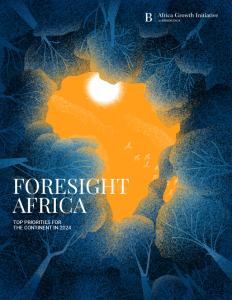 Highlighting top priorities for Africa
Highlighting top priorities for Africa
The Brookings Africa Growth Initiative (AGI) launched its 14th annual Foresight Africa report—one of our most-read publications. With contributions from African finance ministers, central bank governors, multilateral heads, and business leaders alongside research by AGI experts, the report outlined top priorities and recommendations for the region in the year ahead.
Elevating US contributions to global development
On January 10, the U.S. Agency for International Development swore in Michele Sumilas as head of its new bureau of Planning, Learning and Resource Management. Senior Fellow George Ingram has long championed such a joining of policy and budget functions as a key part of improving the agency’s effectiveness.
FEBRUARY
Analyzing the global economy and markets
Global welcomed Robin Brooks as a senior fellow focused on global growth and inflation dynamics, capital flows to emerging and frontier markets, as well as Western sanctions policy and the G7 oil price cap on Russia. Brooks regularly contributes to our Global Economy and Markets blog series alongside other Global experts.
MARCH
Strengthening North American economic integration
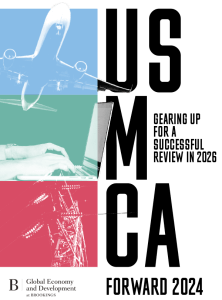 The USMCA initiative at Brookings published its third annual USMCA Forward report taking stock of the United States-Mexico-Canada Agreement. This year’s report featured on how the three parties can further leverage USMCA to strengthen economic relations in the lead-up to the agreement’s joint review in 2026, with chapters from prominent academics and thought leaders as well as viewpoints from senior leaders in government, business, and civil society.
The USMCA initiative at Brookings published its third annual USMCA Forward report taking stock of the United States-Mexico-Canada Agreement. This year’s report featured on how the three parties can further leverage USMCA to strengthen economic relations in the lead-up to the agreement’s joint review in 2026, with chapters from prominent academics and thought leaders as well as viewpoints from senior leaders in government, business, and civil society.
APRIL
Global around the World Bank/IMF Spring Meetings
On the sidelines of the 2024 World Bank/IMF Spring Meetings, Global organized a number of impactful convenings to inform discussions on global financial reform, climate action and sustainable development, trade and investment, and transforming education.
- Reimagining the global financial architecture
- Finance ministries' critical role in climate action
- Driving sustainable development in Africa
- Accelerating trade and investment in Africa
- Transforming systems for and through inclusive education
MAY
Collaborating to improve pedagogy
The SPARKS project in our Center for Universal Education launched three new Research Policy Collaboratives in Egypt, India, and Mexico. Through these hubs, local education actors are coming together to better understand the impact of culture, local education ecosystems, and learning theories on classroom practice and pedagogical reform.
JUNE
Building deeper partnerships between families, schools, and communities
Our Center for Universal Education brought together members of its Global Family Engagement in Education Network, national associations, and school district officials to explore ways to deepen partnerships for education. The symposium served as the launch for the FSCE initiative’s suite of tools, including the Six Global Lessons and the Conversation Starter Tools, aimed at fostering relational trust between families, schools, and communities.
Integrating care into climate adaptation
The City Learning Lab—a spin-off project from the 17 Rooms initiative—began work with the CHANGE network on a toolkit to help cities integrate care services into climate adaptation plans, with a focus on inclusivity and resilience. Senior Fellow Caren Grown was instrumental in the initiation of this project.
JULY
Informing US development finance reform
On July 11, the House Foreign Affairs Committee reauthorized the BUILD Act with bipartisan support. Senior Fellow George Ingram, a founder and board member of the Modernizing Foreign Assistance Network (MFAN), played a key role by co-leading MFAN’s subgroup on the U.S. Development Finance Corporation (DFC). The group’s nine-point plan significantly shaped the bill. He also testified before DFC on modernizing development finance.
AUGUST
Revitalizing distressed US communities
The White House cited work by Anthony F. Pipa and Zoe Swarzenski in their readout on convenings of philanthropies on place-based economic development, workforce development, and career pathways. Pipa and Swarzenski’s article analyzed the Economic Development Administration’s (EDA) new Recompete Pilot Program and its potential impact on the United States’ most distressed communities.
Measuring progress on the Sustainable Development Goals
As we crossed the midpoint of the Sustainable Development Goals (SDGs), the Center for Sustainable Development at Brookings assessed the world’s progress on the goals. With four tests and eight key findings, the report by Homi Kharas, John W. McArthur, and Odera Onyechi identified areas of strength and weakness as we head toward 2030.
SEPTEMBER
Engaging youth in an election year
This year, back to school also meant back to the topic of youth engagement in elections and democracy. Our Center for Universal Education and partners continued its work in this area examining the role of youth voices in an election year and the importance of civic education.
Global at UNGA
Throughout the United Nations General Assembly (UNGA) meetings, scholars from the Global Economy and Development program served as trusted voices in high-level international forums, contributing significantly to discussions on multilateralism and the strengthening of international financial systems, among others.
- Fireside chats with prime ministers
- American leadership on the Sustainable Development Goals
- SDG Moment
- US elections and the future of multilateralism
- Global education
OCTOBER
Managing economic change in a transforming world
Global and the Korea Development Institute launched “New Global Dynamics,” an edited volume on the vital role of international institutions in managing the impacts of shifting geopolitics, the digital revolution, and climate change in a rapidly changing world.
Global around the IMF-World Bank annual meetings
During the annual meetings of the IMF and World Bank, Global again convened key players in discussions on the international financial architecture and sustainable development.
- Global South perspectives on climate, development, and finance
- Tackling Africa’s debt crisis through credit ratings
Meeting the global climate finance challenge
As climate-related crises continued to intensify and COP29 approached, Global hosted a conversation with Simon Stiell, executive secretary of the United Nations Framework Convention on Climate Change, on ways to expand access to climate finance to drive action, reduce climate risk, and unlock sustainable economic growth.
NOVEMBER
Informing climate finance discussions at COP29
At COP29 in Baku, Senior Fellow Amar Bhattacharya played a key role in climate finance discussions. Alongside Nonresident Senior Fellow Vera Songwe and economist Nicholas Stern, Bhattacharya launched a landmark report by the U.N.’s Independent High-Level Expert Group on Climate Finance (IHLEG), estimating that developing nations will need at least $1 trillion annually to meet global targets.
Opening pathways to good jobs
Global welcomed Eduardo Levy Yeyati as senior fellow to lead our work on the path to good jobs for those in low-productivity and low-wage occupations, as well as on better connecting education and training to jobs in a time of great technological change.
DECEMBER
Reforming public procurement in Nigeria
The Africa Growth Initiative wrapped up its joint project with Stellenbosch University and the Centre for the Study of the Economies in Africa on four promising areas for change in Nigerian public procurement: applying behavioral insights to anti-corruption tools, implementing gender-responsive procurement policies, promoting transparency through open procurement data, and documenting procurement skills gaps to inform professional development programs.
Welcoming a new director of the Africa Growth Initiative
Pierre Nguimkeu joined Global as director of the Africa Growth Initiative. Nguimkeu brings a data-driven, empirical approach to research on Africa’s development challenges and opportunities, including how access to credit, kinship networks, and digital technologies can promote employment, entrepreneurship, productivity, and structural transformation.
The Brookings Institution is committed to quality, independence, and impact.
We are supported by a diverse array of funders. In line with our values and policies, each Brookings publication represents the sole views of its author(s).
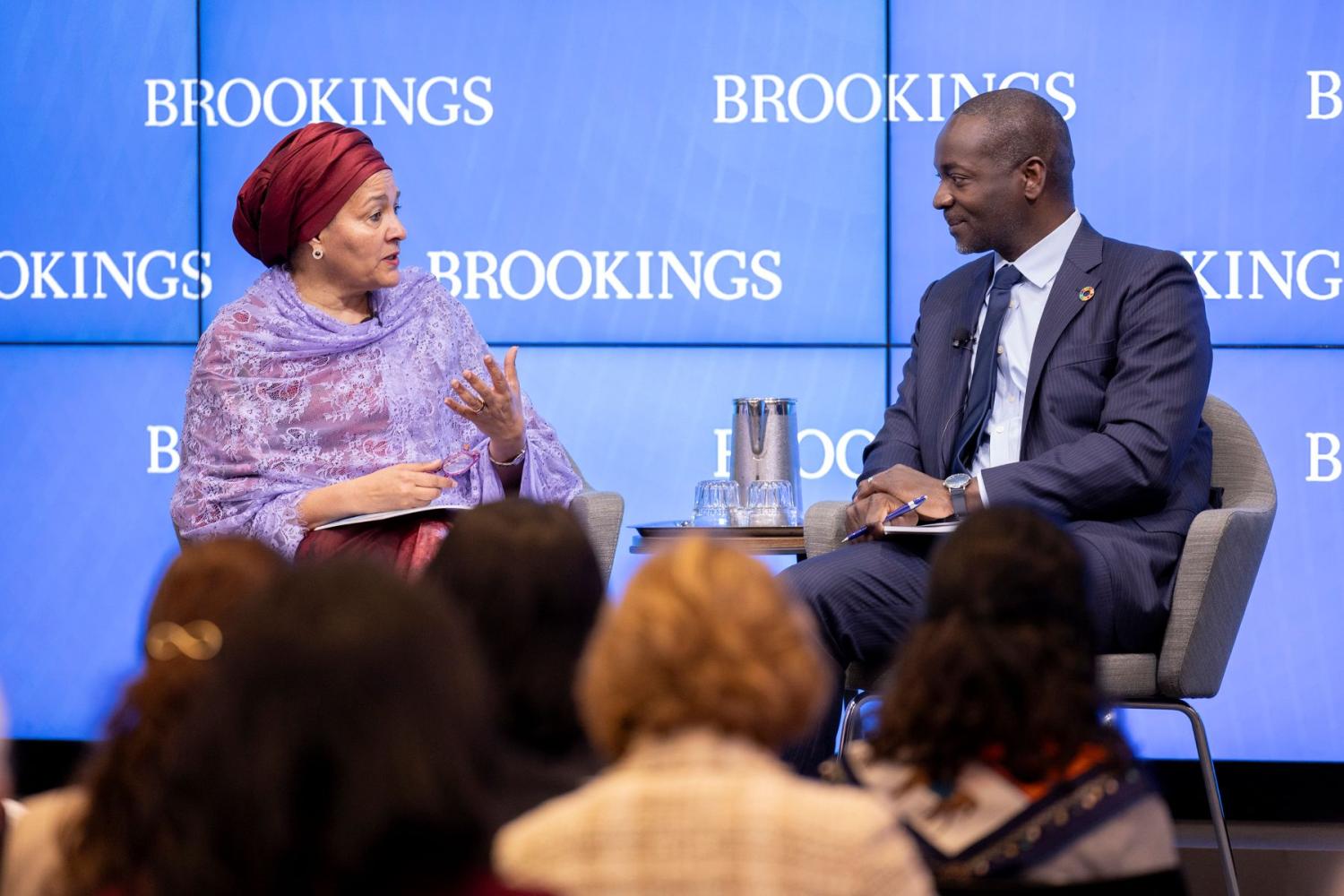

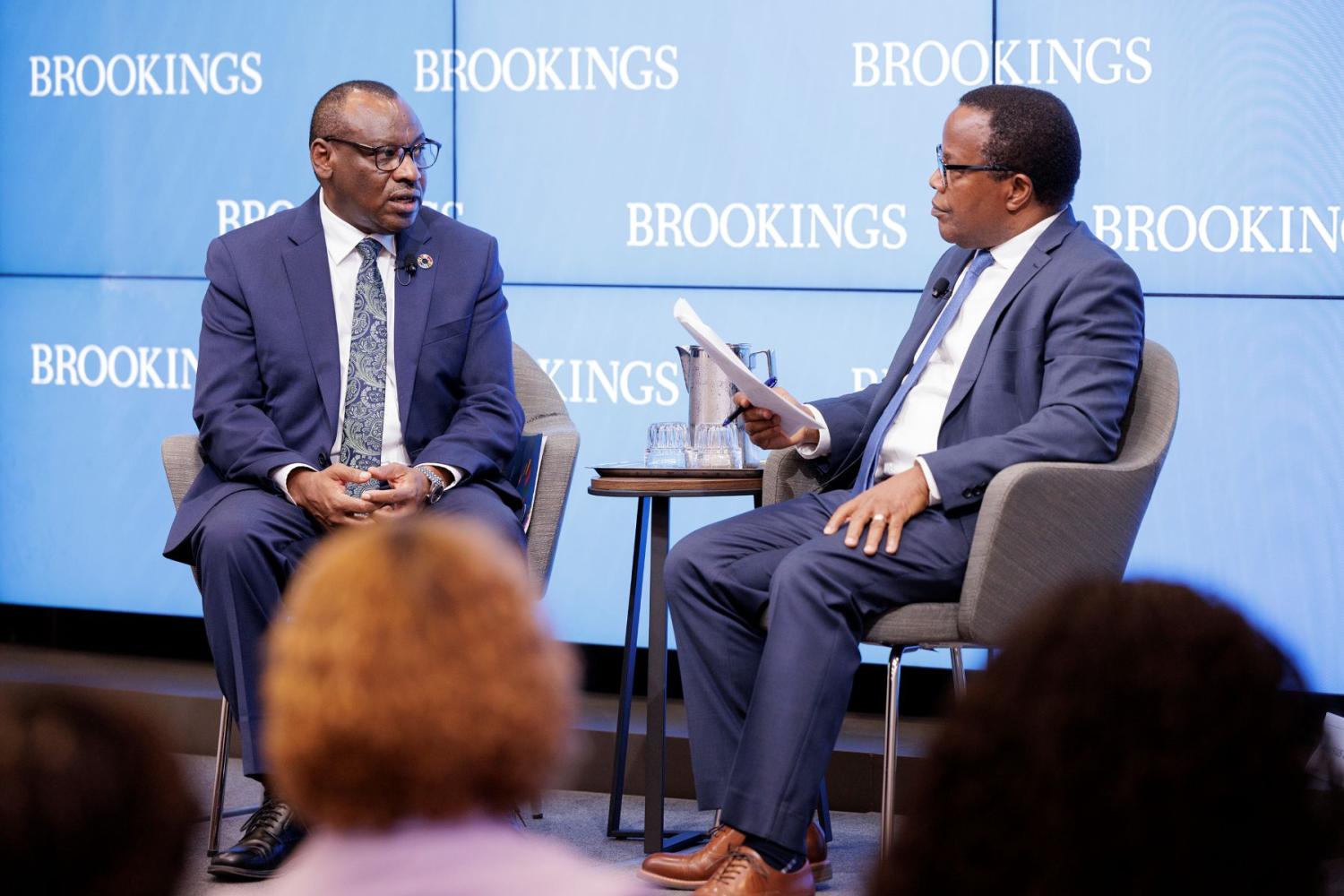
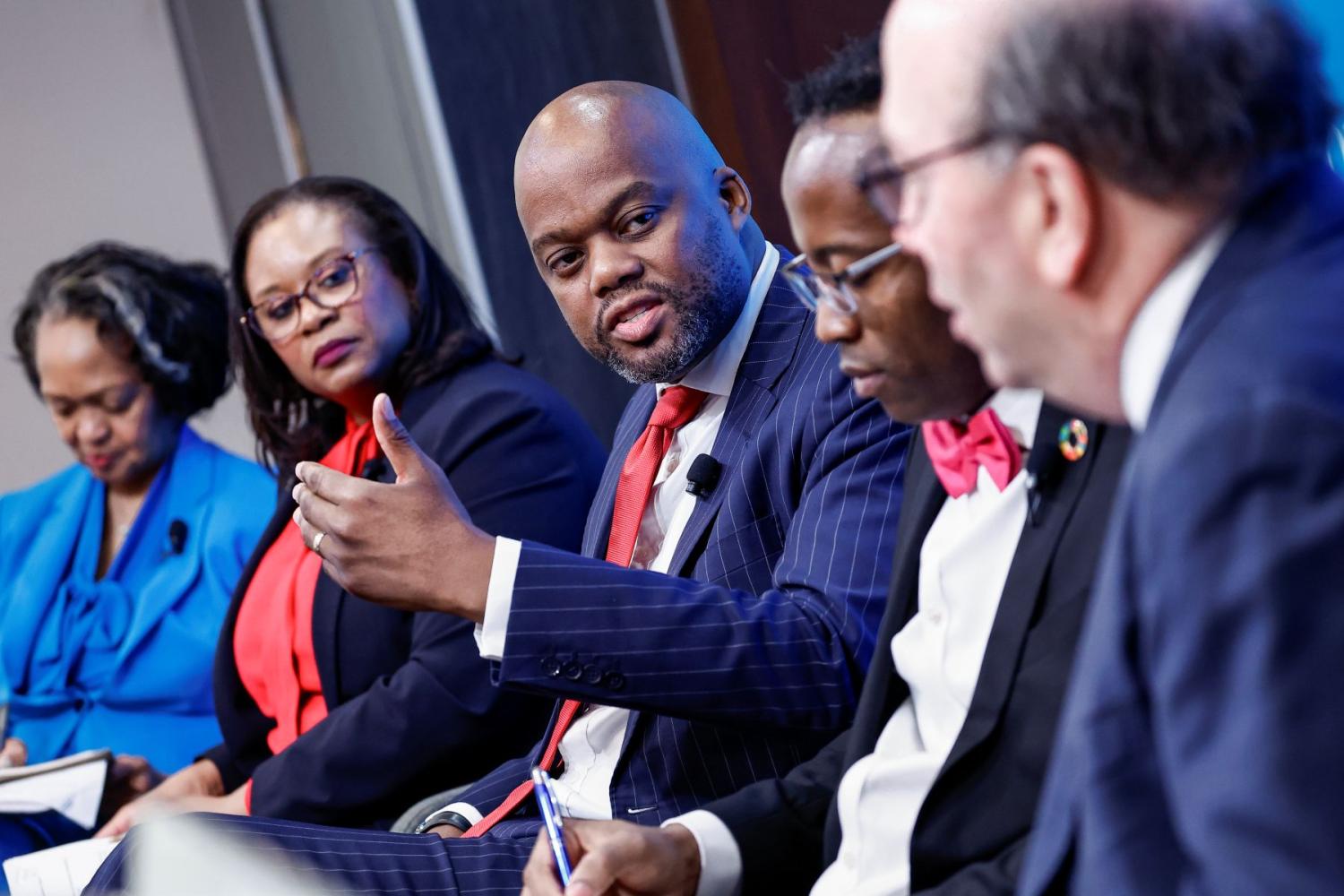

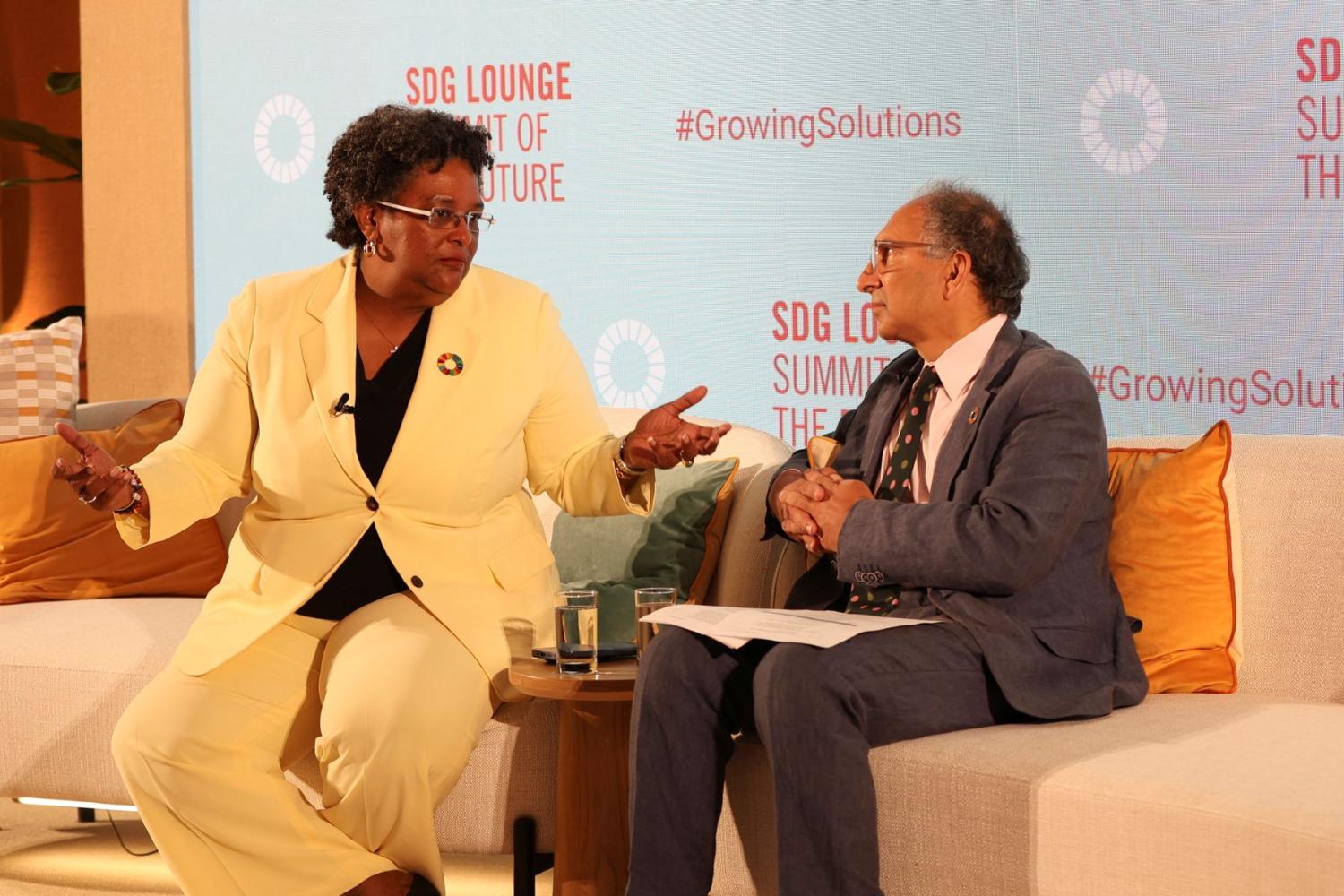
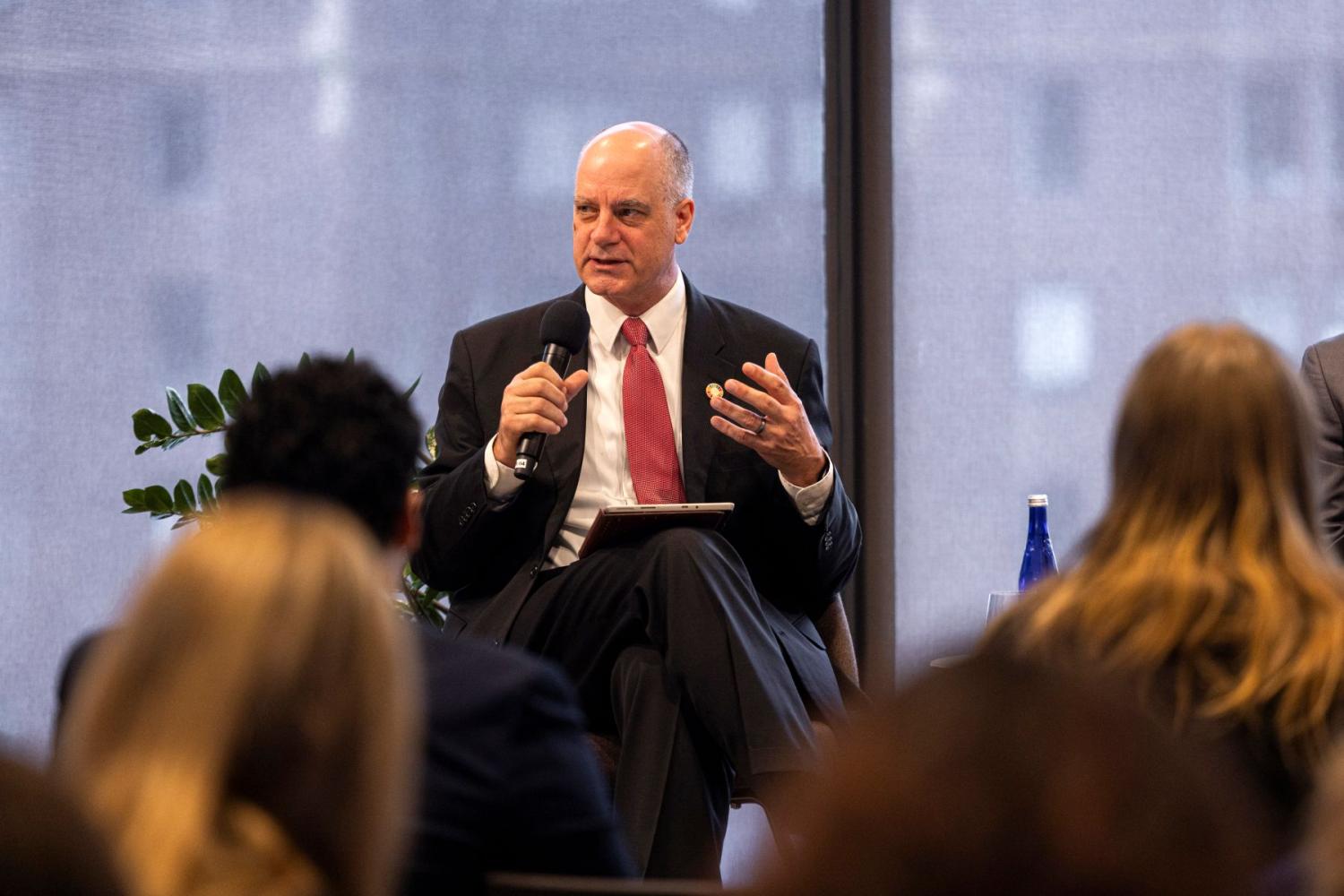
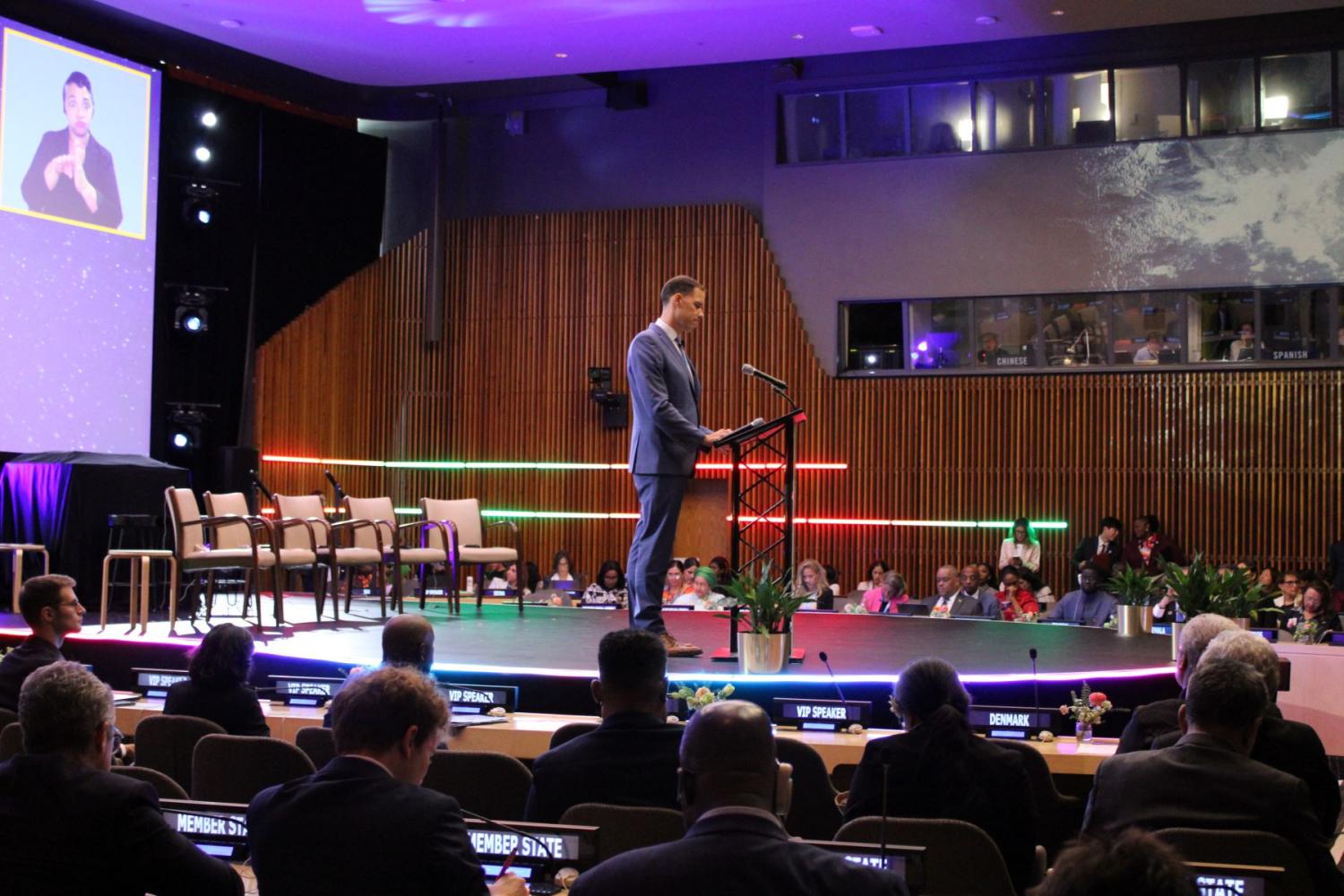

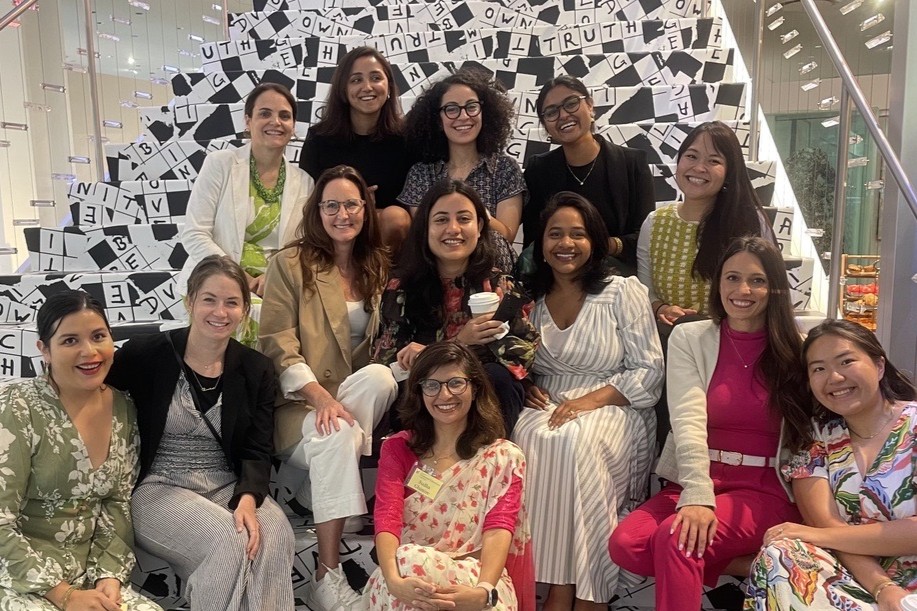
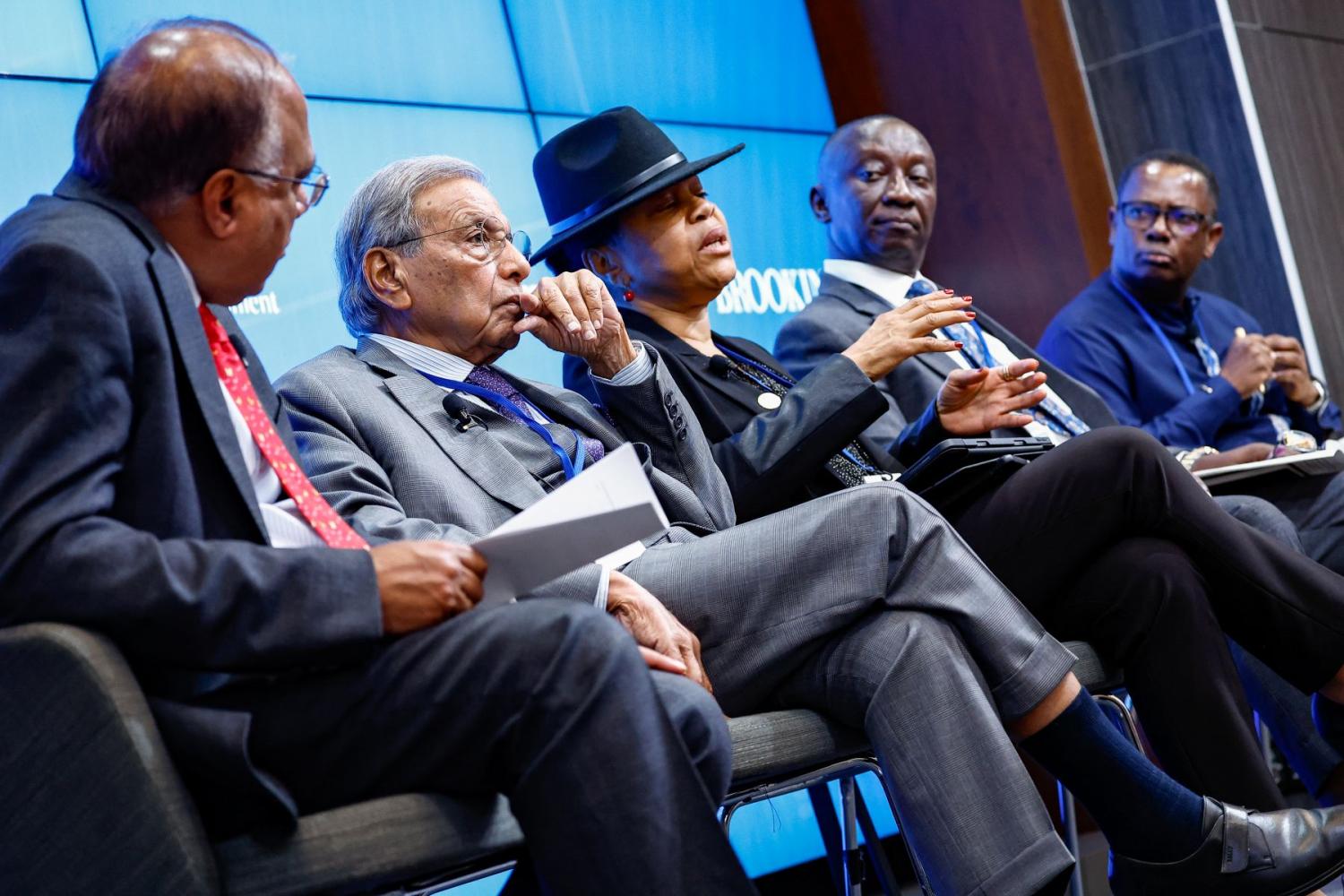
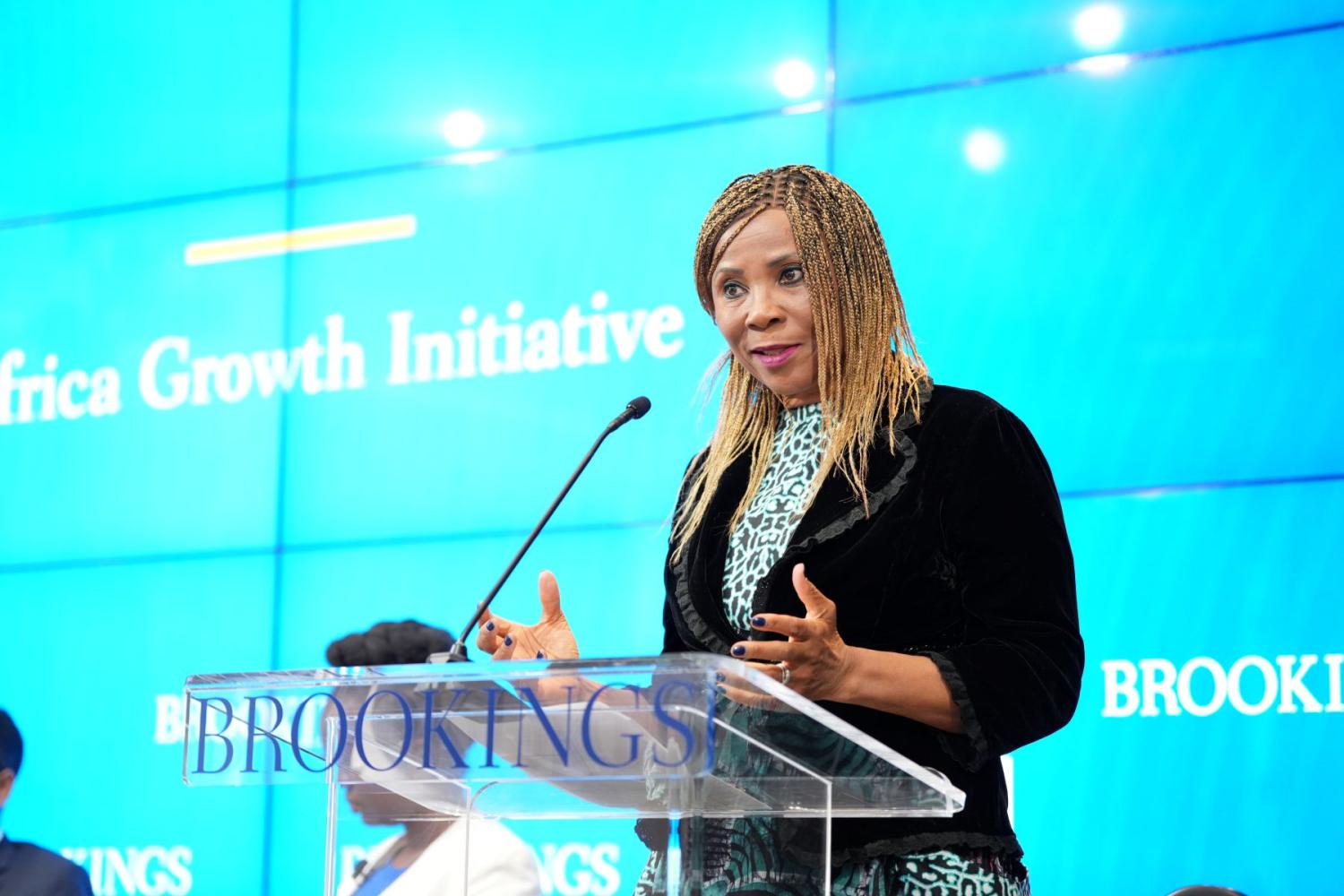
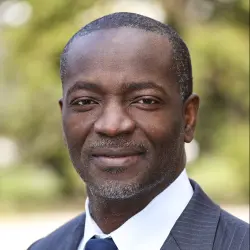
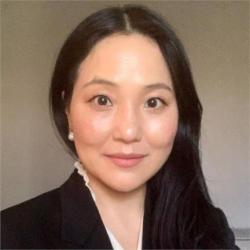



Commentary
Year-end reflections and global economic outlook for 2025
December 20, 2024